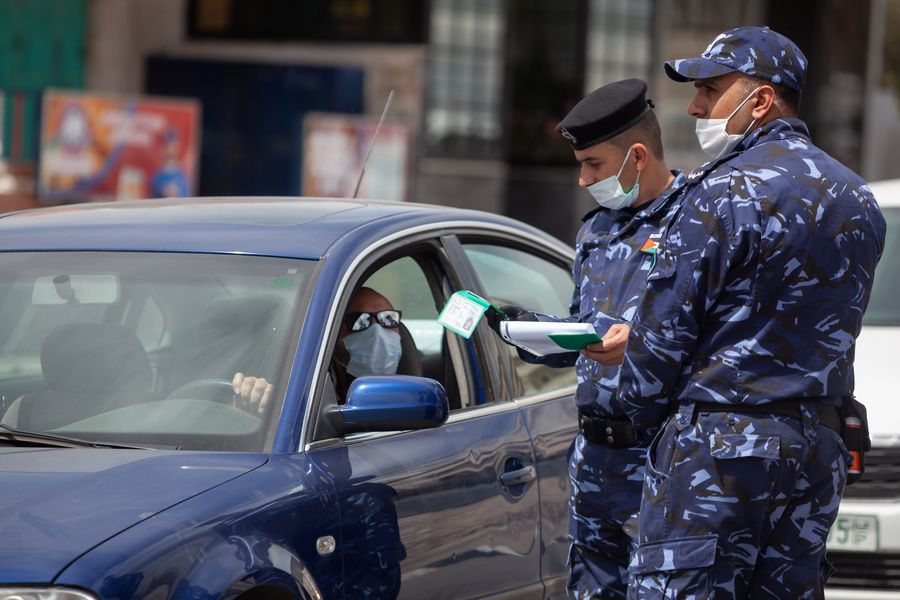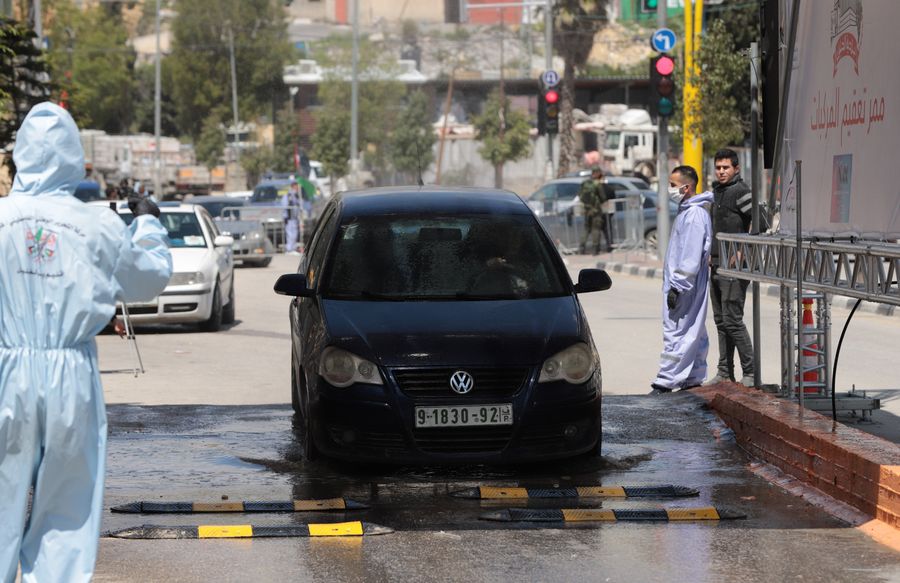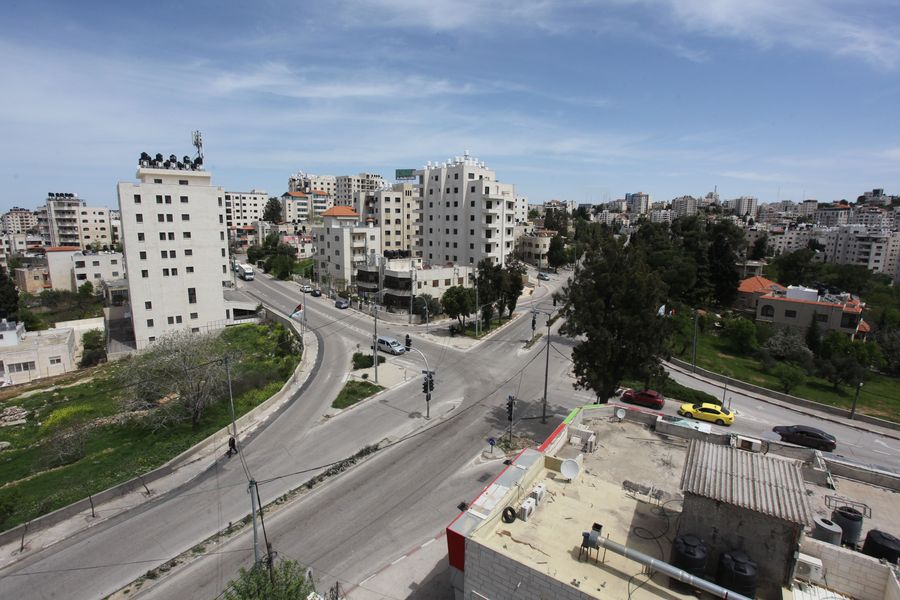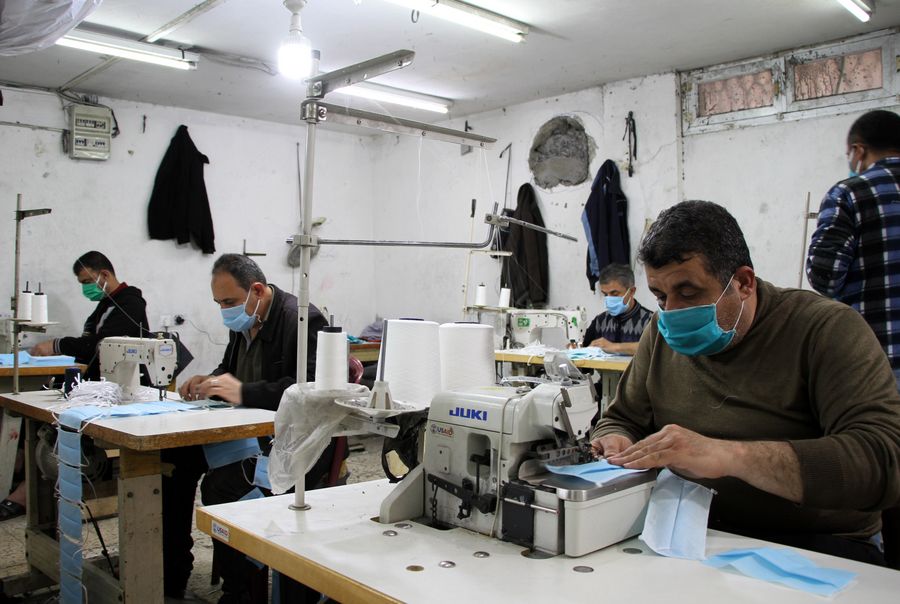
A Palestinian police officer questions a driver during a campaign to seize drivers who violate the emergency law in the West Bank city of Bethlehem, April 6, 2020. (Photo by Luay Sababa/Xinhua)
Emulating the Chinese experience in containing the coronavirus, containment measures followed by Palestinians helped keep the outbreak to a minimum, said head of WHO in Palestine.
by Fatima AbdulKarim
RAMALLAH, April 13 (Xinhua) -- The Palestinian city of Bethlehem turned from a bustling tourist destination to deathly quiet once the first cases of coronavirus were confirmed on March 4. The city fell under quarantine the next morning.
Empty streets, closed souvenir shops and evacuated hotels brought life to a halt, a reality unrelated to the territory's military occupation.
The next day after the first seven cases were found in a visiting Greek tourist group at a Bethlehem hotel, Palestinian President Mahmoud Abbas declared a state of emergency, under which the Palestinian government empowered district governors to take necessary measures to prevent the spread of the virus under clear guidelines -- isolation, movement limitation and sterilization.
Schools, churches, mosques, shops and restaurants were closed, gatherings banned, hotel reservations canceled, people were asked to stay at home and movement between cities was restricted to the minimum based on necessity, emulating the Chinese experience in containing the coronavirus.
One city after another, the entire West Bank was locked down to protect the citizens from an outbreak.

A car goes through a special corridor to sterilize vehicles as a measure to fight against COVID-19 at an entry checkpoint in the West Bank city of Hebron, on April 12, 2020. (Photo by Mamoun Wazwaz/Xinhua)
A spokesperson for the Palestinian Interior Ministry Ghassan Nimer told Xinhua that a crisis management committee was created as early as Feb. 23, when initial signals of the deadly virus became apparent.
"We looked in depth at all attempts to fight the virus, but we found two basic experiences to rely on; the first being the Chinese experience that was based on isolation and physical distancing, which proved successful in cornering the disease, and the other was the widest possible testing of monitored and random cases, but that was not possible due to the shortage of testing kits," Nimer said.
"Therefore, we implemented what was done in Wuhan in Bethlehem," he added, noting that the city is now recovering, but the crisis is not over yet.
The lockdown has put the Palestinian economy in a serious financial crisis since the decades-long Israeli occupation of the West Bank has left Palestinians with no control over their borders and a struggling economy highly dependent on Israel.
In light of shrinking revenues amidst the COVID-19 pandemic, the Palestinian government declared an emergency austerity budget for six months starting from April, giving top priority to funding the healthcare system and providing a safety net for the poor.
The crisis prompted the Palestinian government to ask Israel for 140 million U.S. dollars to support its emergency budget.

Photo taken on April 4, 2020 shows a general view of empty streets in the West Bank city of Ramallah. (Photo by Nidal Eshtayeh/Xinhua)
Living in the center of the busy Ramallah city and working for a private company, Reem Qawasmi, 35, told Xinhua she yearns for life as it was before the lockdown.
"I think the precautions taken by the Palestinian Authority to limit the spread of the virus will have a significant effect on the economy; however, I still think they were put in place early enough in a way that protected our healthcare system," she said. "Seeing what happened to countries that didn't take enough precautions, I think our approach was good."
Away from city centers, local residents formed emergency committees in their villages and towns to make sure movement restrictions were not violated and those under home quarantine have their needs met.
The Interior Ministry spokesperson said that the role of those committees was essential to managing the situation outside of the Palestinian Authority's control.

Palestinian workers make face masks at a factory in Gaza City on April 13, 2020. (Photo by Rizek Abdeljawad/Xinhua)
The Palestinian measures were applauded by the World Health Organization (WHO).
Gerald Rockenschaub, the head of WHO in Palestine, told Xinhua that containment measures followed by Palestinians helped keep the outbreak to a minimum.
The number of COVID-19 cases confirmed in Palestine since the start of the outbreak stood at 268 as of Sunday, including two deaths.
Secretary General of the Palestinian People's Party Bassam Salhi told Xinhua that Palestine has learned from China's prompt and bold decision to isolate certain areas.
"All precautionary measures we followed were important and early, and it was all inspired by China's work, including providing medical equipment and setting up quarantines," Salhi said.
"We have deep respect for China, which is Palestine's old friend," Salhi said, "and we hail their supportive positions, including a willingness to help the Palestinian people face the pandemic through their experience and know-how." ■



